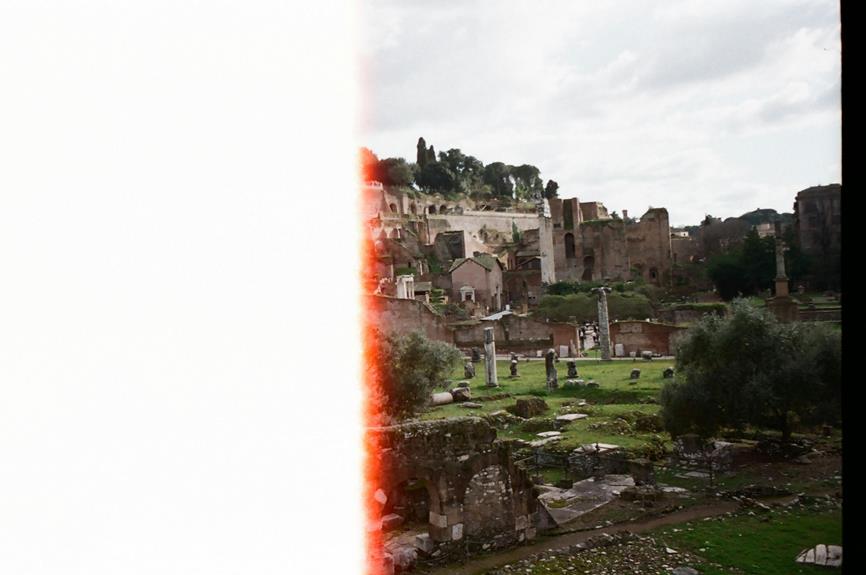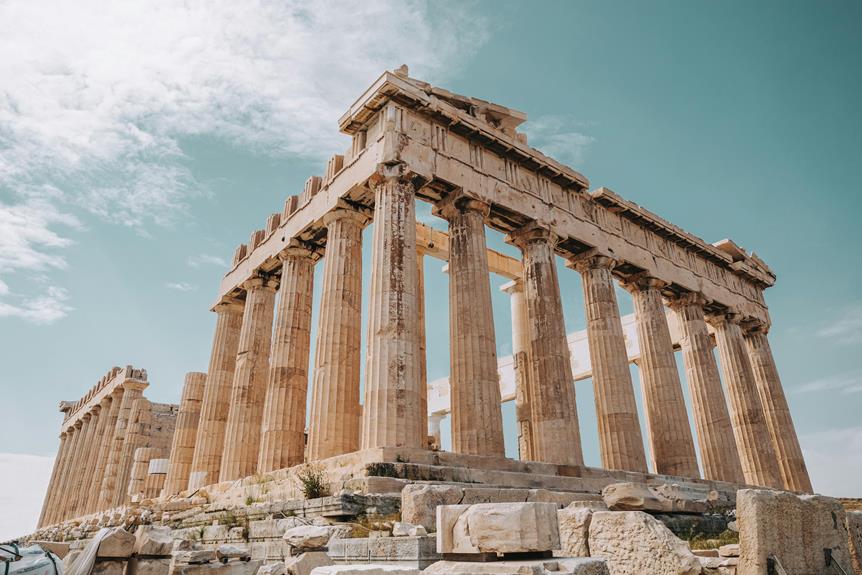Nestled in the heart of France, Verdun quietly echoes the tumultuous past etched into its very soil. Beyond the serene façade lies a town that witnessed the harrowing Battle of Verdun, a pivotal moment in history that shaped nations. As visitors traverse its cobblestone streets, they are enveloped by a sense of solemnity and awe, a reminder of the sacrifices made on this hallowed ground. But Verdun is more than a mere battleground; it holds secrets waiting to be revealed, stories whispered through time that beckon exploration into its depths.
Key Takeaways
- Historic significance from World War I with over 700,000 casualties.
- Explore battlefields through tours, ceremonies, and educational programs.
- Architectural marvels like Notre-Dame Cathedral and Chateau de Hattonchatel.
- Enjoy culinary delights with farm-to-table delicacies and vibrant food markets.
- Discover hidden gems in nature trails, local artisans, and artistic charm beyond the city.
Historical Significance of Verdun
What historical events have contributed to the profound significance of Verdun in the annals of European history?
One of the most impactful battles that took place in Verdun was the Battle of Verdun during World War I. Lasting from February to December 1916, this battle between the French and German armies resulted in over 700,000 casualties and is often referred to as one of the longest and most grueling battles in history. The intense fighting and tremendous loss of life at Verdun left an indelible mark on both the landscape and the collective memory of Europe.
Today, Verdun stands as a symbol of resilience and remembrance, with numerous memorial sites scattered throughout the region. The Douaumont Ossuary, for example, houses the remains of soldiers who perished in the battle, serving as a somber reminder of the human cost of war. The Fort de Vaux and Fort de Douaumont, once scenes of fierce fighting, now stand as preserved historical sites where visitors can learn about the events that unfolded during the battle.
The historical significance of Verdun extends beyond the physical remnants of war; it represents a tribute to the enduring spirit of those who fought and the importance of honoring their sacrifices. The impact of the Battle of Verdun reverberates through time, ensuring that future generations remember the horrors of war and aim for a more peaceful world.
Exploring Verdun's Battlefields
The exploration of Verdun's battlefields provides a poignant and immersive experience into the historical significance and lasting impact of the Battle of Verdun during World War I. Walking through the fields where intense fighting took place allows visitors to understand the scale of the conflict and appreciate the sacrifices made by soldiers on both sides.
- Battlefield tours: Guided tours offer visitors a detailed insight into the strategies, tactics, and human stories that unfolded during the Battle of Verdun. These tours often include visits to key sites such as Fort Douaumont, the Ossuary of Douaumont, and the Trench of Bayonets, providing a thorough understanding of the battle.
- Remembrance ceremonies: Attending remembrance ceremonies in Verdun is a powerful way to honor the memory of the soldiers who fought and died in one of the most brutal battles of World War I. These ceremonies, often held at significant monuments and cemeteries, serve as a reminder of the human cost of war and the importance of peace.
- Educational programs: Engaging in educational programs offered in Verdun allows visitors to explore further into the historical context of the battle and its aftermath. These programs may include lectures, exhibitions, and interactive experiences that shed light on the political, social, and cultural impacts of the Battle of Verdun.
Architectural Marvels in Verdun
Amidst the historical resonance of Verdun's battlefields, the city also boasts a collection of architectural marvels that stand as proof of its rich heritage and enduring spirit. One of the most striking examples of architectural beauty in Verdun is the Gothic Cathedral of Notre-Dame. This masterpiece of Gothic architecture dates back to the 11th century and showcases stunning stained glass windows, intricate stone carvings, and soaring spires that reach towards the sky. The cathedral's grandeur and detailed craftsmanship make it a must-visit for those appreciative of historical and religious significance.
In addition to the Gothic Cathedral, Verdun is also home to several Renaissance chateaus that exude elegance and charm. The Chateau de Hattonchatel, nestled amidst picturesque countryside, is a prime example of Renaissance architecture in the region. Its graceful turrets, ornate facades, and manicured gardens transport visitors back to a bygone era of opulence and refinement.
Exploring these architectural wonders in Verdun offers a glimpse into the city's past glory and cultural richness. The Gothic cathedrals and Renaissance chateaus not only serve as visual delights but also as tangible links to the city's history and artistic legacy. Whether admiring the intricate details of a stained glass window or strolling through the manicured gardens of a chateau, visitors to Verdun are sure to be captivated by the architectural splendors that grace this historic city.
Culinary Delights of Verdun
Renowned for its culinary heritage deeply rooted in local traditions, Verdun offers a gastronomic experience that embodies the essence of French cuisine. The city's local cuisine showcases a rich tapestry of flavors, drawing inspiration from the fertile lands of the Meuse River valley and the culinary expertise passed down through generations. Visitors to Verdun are greeted with a plethora of dining options ranging from quaint bistros to upscale restaurants, each offering a unique take on traditional dishes.
- Farm-to-Table Delicacies: Verdun prides itself on its farm-to-table philosophy, ensuring that the freshest local ingredients are used in every dish. From succulent meats to freshly harvested vegetables, each bite tells a story of the region's agricultural bounty.
- Vibrant Food Markets: The vibrant food markets of Verdun are a feast for the senses, where bustling stalls overflow with colorful produce, artisanal cheeses, and freshly baked bread. Exploring these markets not only offers a glimpse into the daily life of locals but also provides an opportunity to sample authentic flavors straight from the source.
- Historical Gastronomy: Delving into the culinary history of Verdun reveals a fascinating tapestry of flavors that have evolved over centuries. Traditional recipes passed down through the ages offer a glimpse into the past while still delighting modern palates with their timeless appeal.
Hidden Gems of Verdun
Exploring beyond the culinary delights of Verdun uncovers a trove of hidden gems waiting to be discovered by visitors seeking a deeper insight into the city's cultural and historical tapestry. One such gem is the vibrant community of local artisans who infuse their craft with the essence of Verdun. These artisans, ranging from potters to painters, offer a unique perspective on the city's heritage through their creations. Visitors can immerse themselves in workshops, galleries, and boutiques, gaining a firsthand experience of the artistic pulse that beats through Verdun.
In addition to the artistic charm, nature trails provide a serene escape into the lush landscapes that surround Verdun. These trails offer a perfect blend of tranquility and adventure, inviting visitors to explore the natural beauty that thrives just beyond the city limits. Whether it's a leisurely stroll along the banks of the Meuse River or a more challenging hike through the verdant forests of the Argonne, nature trails provide a rejuvenating experience for those looking to connect with the outdoors.
Cultural Experiences in Verdun
Exploring the cultural fabric of Verdun reveals a rich tapestry of historical landmarks, museums, and immersive experiences that offer visitors a profound insight into the city's heritage. In Verdun, cultural experiences are not just about exploring monuments but also immersing oneself in the local traditions and artistic expressions that define the city's identity.
- Local Traditions: Immerse into the heart of Verdun by experiencing its local traditions, from traditional festivals celebrating the city's history to culinary delights that have been passed down through generations. Participating in events like the annual Flea Market or exploring the local markets can provide a glimpse into the everyday life of Verdun's residents.
- Art Galleries: Verdun boasts a vibrant art scene, with numerous galleries showcasing works by local and international artists. From contemporary pieces to classical masterpieces, these galleries offer a diverse range of artistic expressions that reflect the city's cultural diversity. Visitors can explore these galleries to gain a deeper understanding of Verdun's artistic heritage and creative community.
- Cultural Events: Throughout the year, Verdun hosts a variety of cultural events that celebrate music, dance, theater, and more. Attending performances or festivals allows visitors to engage with the city's cultural scene firsthand, fostering a sense of connection and appreciation for the arts in Verdun.
Frequently Asked Questions
Are There Any Ghost Stories Associated With Verdun, France?
Haunted tales and spooky legends often captivate audiences, drawing them into the domain of supernatural encounters and paranormal activity.
These stories, rich in mystery and intrigue, have been passed down through generations, fueling curiosity and fascination with the unknown.
From eerie apparitions to unexplained phenomena, ghost stories have a way of stirring our imaginations and leaving us questioning the boundaries of reality.
What Traditional Crafts or Artisanal Products Can Be Found in Verdun?
Traditional crafts and artisanal products play a vital role in preserving cultural heritage and supporting local economies. These unique items often reflect the history and traditions of a region, showcasing the skills and creativity of local artisans.
From handcrafted textiles and pottery to intricate jewelry and woodwork, traditional crafts offer a glimpse into the rich cultural tapestry of a community. Embracing these artisanal products not only supports local businesses but also helps to sustain traditional craftsmanship for future generations.
Is There a Specific Dress Code for Visiting Religious Sites in Verdun?
When visiting religious sites, it is essential to adhere to the dress code out of respect for the cultural practices and beliefs. Modesty attire is often required, which typically includes covering shoulders, knees, and sometimes head.
This signifies an understanding of cultural etiquette and appreciation for the religious significance of the site. By dressing appropriately, visitors show a level of respect and consideration for the beliefs and traditions of the place they are visiting.
Are There Any Unique Local Festivals or Events in Verdun?
A variety of unique local festivals and events occur in many cities around the world. These celebrations often showcase the community's vibrancy and cultural heritage through a range of activities.
From traditional local cuisine and wine tastings to cultural performances and art exhibitions, these events offer a glimpse into the heart and soul of a place, allowing visitors to immerse themselves in the local culture and traditions.
Can Visitors Participate in Any Outdoor Activities in Verdun Besides Battlefield Tours?
Outdoor sports and nature exploration opportunities abound in many destinations beyond battlefield tours. Visitors can engage in activities such as hiking, cycling, kayaking, and wildlife watching. These activities provide a chance to immerse oneself in the natural beauty of a region, offering a rejuvenating break from standard tourist activities.
Whether exploring lush forests, serene rivers, or rugged mountains, participants can enjoy a deeper connection with the environment and local culture.
Conclusion
To sum up, Verdun, France, stands as a strong symbol of resilience and remembrance, with its historical significance, architectural marvels, culinary delights, hidden gems, and cultural experiences.
One example of the city's rich heritage is the annual Verdun Enchanted Nights event, where the streets come alive with light installations, art installations, and performances, showcasing the city's artistic legacy and bringing the community together in celebration.


